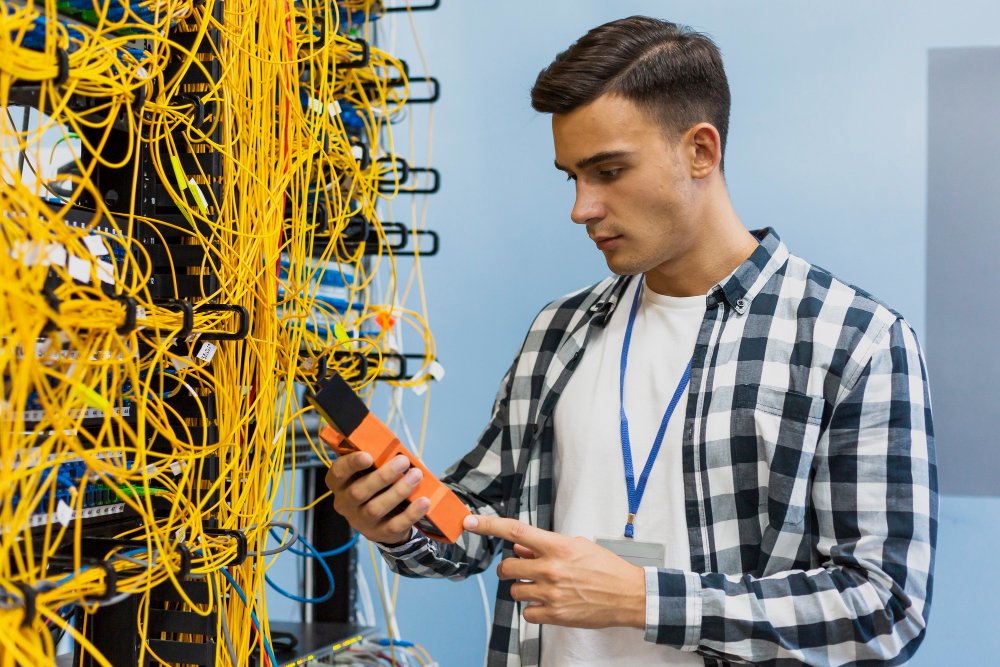In today’s world, fast and reliable internet has become essential for almost every aspect of daily life, from education and work to entertainment and communication. As technology advances, so does the demand for faster and more stable internet connections. One of the latest and most promising solutions to meet this growing need is fiber-optic internet. Fiber internet service providers are at the forefront of this shift, offering customers a significantly enhanced online experience.
What Is Fiber Internet?
To understand what fiber internet is and why it’s superior to other options, it helps to know a bit about the technology behind it. Traditional internet services, like DSL and cable, rely on copper wires to transmit data. While these have served us well for years, they have limitations, especially when it comes to speed and data capacity.
Fiber-optic internet, on the other hand, uses thin strands of glass or plastic fibers to transmit data as light signals. This allows for much faster data transfer rates and more bandwidth than copper-based systems. Fiber technology is capable of supporting high-speed internet connections that can reach up to 1 Gbps (gigabit per second) and beyond, making it an ideal solution for heavy internet users, businesses, and those who want the fastest internet speeds available.
Why Choose Fiber Internet?
There are several reasons why more people are choosing fiber internet over traditional forms of connectivity. Here are a few key benefits:
1. Faster Speeds
The most obvious advantage of fiber-optic internet is speed. While other types of internet connections, such as DSL or cable, can handle typical online activities like browsing, streaming, and video calls, fiber offers speeds that are often hundreds of times faster. This makes fiber ideal for households with multiple users, especially those who regularly stream 4K videos, participate in online gaming, or download large files.
2. Reliable Connection
Fiber-optic cables are much more reliable than copper wires. Weather conditions, such as heavy rain or snow, can often interfere with traditional connections, causing disruptions or slower speeds. Fiber internet, on the other hand, is far less vulnerable to these issues, providing a more consistent and reliable connection.
3. Higher Bandwidth
Bandwidth refers to the amount of data that can be transferred at one time. With more people working from home, attending virtual meetings, and consuming high-quality streaming services, bandwidth has become increasingly important. Fiber internet provides significantly more bandwidth, meaning that users can stream, work, and browse without experiencing slowdowns, even during peak usage times.
4. Symmetrical Upload and Download Speeds
One of the unique aspects of fiber internet is that it often offers symmetrical speeds. This means that both the upload and download speeds are equally fast. This is particularly useful for those who engage in video conferencing, upload large files to cloud services, or participate in online gaming, where quick uploads are as important as fast downloads.
5. Future-Proof Technology
Fiber internet is considered the future of connectivity because of its ability to handle higher data demands. As the world becomes more digital and technology evolves, the need for faster and more reliable internet will only increase. Investing in fiber now means being ready for whatever the future holds in terms of internet needs.
How Does Fiber Internet Work?
Fiber internet service providers use a network of fiber-optic cables to deliver internet access. These cables are made of extremely thin strands of glass or plastic, which are capable of carrying data in the form of light signals over long distances without losing quality or speed.
Here’s a breakdown of how fiber internet works:
- Transmission of Light Signals: Data is transmitted as light signals along the fiber-optic cables. These light signals move at incredibly high speeds, making it possible to deliver data much faster than traditional methods.
- High-Capacity Lines: Fiber-optic cables can carry large amounts of data at once, unlike copper wires, which can become overloaded, leading to slower speeds.
- Conversion to Digital Signals: Once the light signals reach their destination, they are converted back into digital signals that your computer, phone, or other internet-enabled devices can understand and use.
Because fiber internet service providers rely on advanced infrastructure, they often require a direct fiber connection to your home or business. This is known as “fiber to the home” (FTTH) or “fiber to the premises” (FTTP), and it’s one of the reasons why fiber internet is so fast and reliable.
The Growth of Fiber Internet
The adoption of fiber internet has grown rapidly over the past decade, driven by increasing consumer demand for faster speeds and more reliable connections. Many regions around the world are making significant investments in fiber infrastructure to ensure that more people can access this advanced technology.
As fiber internet becomes more widely available, it is expected to replace older technologies like DSL and cable in many areas. Fiber internet service providers are continually expanding their networks to cover more locations, particularly in urban and suburban areas where high-speed internet is in the greatest demand.
The Advantages of Fiber for Businesses
While fiber internet is popular among households, businesses also stand to benefit significantly from adopting this technology. The advantages for businesses include:
- Increased Productivity: With faster internet speeds, employees can complete tasks more quickly, reducing downtime and boosting productivity.
- Improved Collaboration: With symmetrical speeds, businesses can easily handle video conferencing, file sharing, and other collaborative tools without lags or interruptions.
- Scalability: As businesses grow, their internet needs often increase as well. Fiber internet is easily scalable, meaning companies can upgrade to higher speeds without significant changes to their infrastructure.
- Enhanced Security: Fiber-optic networks are harder to intercept compared to traditional copper cables, making fiber internet a more secure option for businesses concerned about data security.
Overcoming Challenges
Despite its many benefits, there are still challenges associated with fiber internet. One of the main barriers is the cost of installation, particularly in rural or remote areas where laying fiber-optic cables can be expensive. While the initial costs may be high, the long-term benefits of faster, more reliable internet often outweigh these expenses.
Another challenge is the availability of fiber internet. While fiber internet service providers are expanding their networks, it is still not available everywhere. In many rural or underserved areas, traditional internet services remain the primary option. However, as the demand for high-speed internet grows, more regions are likely to invest in fiber infrastructure, making it accessible to a broader population.
The Future of Fiber Internet
As more people recognize the advantages of fiber internet, its adoption will continue to rise. The future of the internet is undoubtedly tied to fiber-optic technology, which has the capacity to meet the growing demand for faster, more reliable, and higher-capacity connections.
In the coming years, we can expect to see fiber internet become the standard for both residential and business internet services. As fiber internet service providers expand their coverage and reduce installation costs, more people will be able to experience the benefits of this cutting-edge technology.
Conclusion
Fiber-optic technology represents a significant leap forward in the world of internet connectivity. Fiber internet service providers offer faster speeds, higher bandwidth, and more reliable connections than traditional methods. As the demand for high-speed internet continues to grow, fiber is becoming the preferred choice for both residential and business users.



